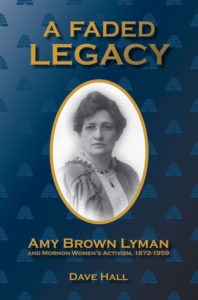 Title: A Faded Legacy: Amy Brown Lyman and Mormon Women’s Activism, 1872–1959
Title: A Faded Legacy: Amy Brown Lyman and Mormon Women’s Activism, 1872–1959
Author: Dave Hall
Publisher: University of Utah Press
Genre: Women’s Studies; Biography
Year Published: 2015
Number of Pages: xvi, 266,
Binding: Cloth
Price: $34.95
Reviewed by Erik Champenois
My wife and I got this book after listening to a Dialogue fireside with Ben Park, which included a presentation of some of Amy Brown Lyman’s impressive accomplishments. Amy Brown Lyman, Relief Society President of the Church of Jesus Christ of Latter-day Saints from 1940 to 1945, and an influential member of the Relief Society Board for decades prior, was an impressive leader in social work and welfare in the early 19th century.
Among her accomplishments: she founded and led the Relief Society Social Service Department, training women throughout the Church in social welfare and maternal and child healthcare work. She served in the Utah state legislature and pushed for Utah’s support of the federal Sheppard-Towner Act, which provided federal matching funds to states for maternal and infant health care. Through her work with both public, private, and church sectors, she contributed to turning around Utah from having some of the worst to some of the best outcomes in maternal and infant health. She also spoke passionately (including in the Church’s General Conference) in favor of women’s suffrage and involvement in politics, of working with government to secure better welfare outcomes, of national health insurance, and on issues of child labor and equal pay for women. She was well connected to other national women’s leaders and to the national women’s club movement, which likewise inspired her own Relief Society initiatives.
Amy Brown Lyman represents a unique turning point in LDS history. Being the child of polygamists, she grew up experiencing the federal antipolygamy efforts of the 1870s and 1880s, and the end of polygamy in 1890 (with its more complete ending in 1904). She started her career at a time of an intense opening up to the world, as Mormonism assimilated into mainstream American society, encouraging a new generation of highly educated members to engage socially, politically, and intellectually with the world. She was part of an era where many Church members embraced progressive social and political change and engaged and updated their religious perspectives through intellectual engagement with modern science and scholarship. She also experienced the turn of the Church (from about the 1930s onwards) towards retrenchment and greater social and political conservatism, which included the Relief Society losing most of its prior autonomy and in the process tragically resulted in a more inwards-and spirituality-oriented Relief Society that did less to improve the world socially and politically. The story of that turn particularly involved Amy Brown Lyman clashing and negotiating with J. Reuben Clark (counselor in the First Presidency), as Clark spoke against government welfare and led the transitioning of prior Relief Society-led welfare activities into the new male-dominated Welfare Program of the Church.
Alongside her public activities, the book covers Lyman’s private life as well, including her childhood years, her social life, her marriage and children. Also covered is the tragic episode of her husband cheating on her, resulting in his excommunication (the most recent historical excommunication of a member of the Quorum of the Twelve), and in Lyman herself being eventually pushed to resign as Relief Society President.
As my wife pointed out while reading this book, the Church has for years had Sunday lessons based on “Teachings of Presidents of the Church” manuals but has never started a series of “Teachings of Relief Society Presidents of the Church.” Amy Brown Lyman is unfortunately rarely remembered by today’s church members, but her story – and that of many other LDS women of her time – is worth remembering, celebrating, and learning from.
